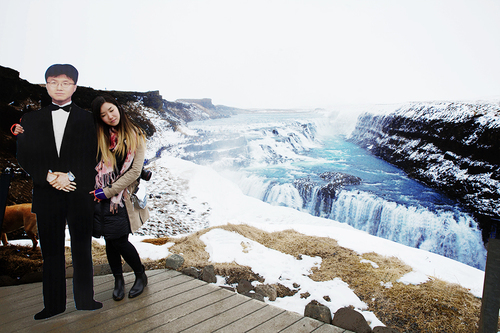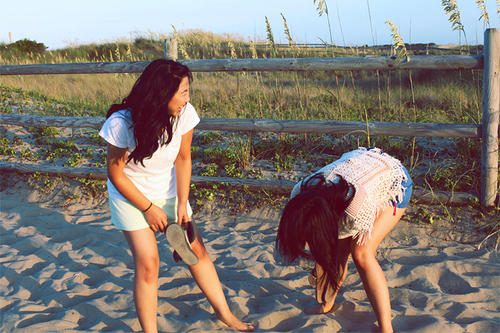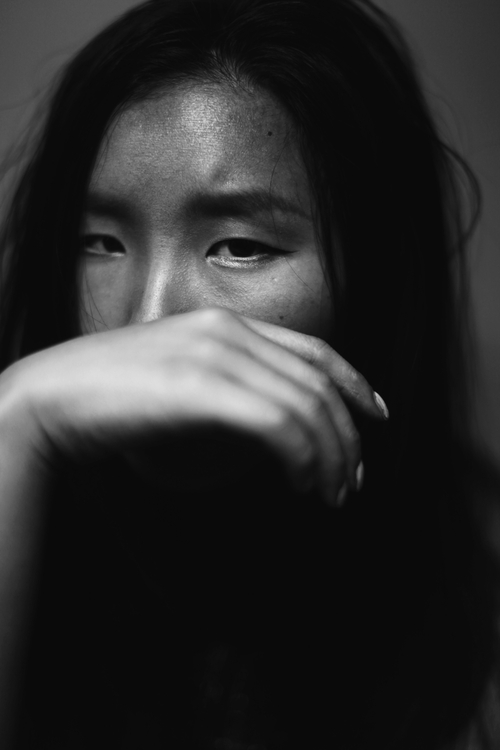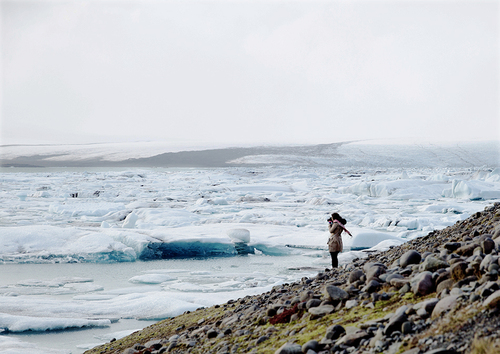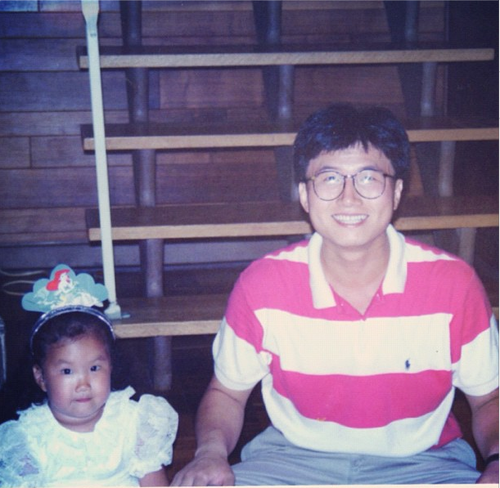It's been two years since my father passed away from cancer (Read: "For My Father"), and it was the hardest time that I have ever experienced in my life. At 24, I was completely lost, unable to express what had just happened to my family, and refused to allow the process of healing begin by closing myself off from everyone around me.
In November of 2013, my younger sister noticed a bald spot the size of a dime in the back of my head. A month later, that bald spot had tripled in size, and another dime-sized spot had formed at the top of my head. Within three months, I had seven bald spots all over my head, and the very first one that I had found (originally the size of a dime) had grown over five inches in diameter.
That was the moment that I realized that my father's death wasn't just affecting me mentally, emotionally or spiritually. It was also affecting me physically, and I absolutely had to make a change in my life.
Dealing with death is a process -- one that may very well continue until my later years in life, and one that is constantly evolving. I took a moment to reflect on the past two years (my father passed on Aug. 24, 2012) -- here are a few things that I've learned about dealing with death during that time.
1. Realize that everyone deals with death differently.
My brother is younger than me by only three years, and the way he processed the death was completely different than mine. Yet he was the only one who knew exactly what I had been through, from the time that my father got diagnosed up until his death. I often tried to compare my situation with those of others -- sometimes just to measure my level of grief to gauge if I was overreacting, or set a potential expiration date of when the pain I was feeling would go away. Was it okay that I was crying myself to sleep every single night a year and a half later?
I've realized that everyone processes death in a different way. Knowing this means that you don't have to second guess your thoughts, feelings and actions. This is your personal journey, and you're allowed to feel, think, say or do whatever it is that you need to heal.
2. Open up and talk about it, but only when you're ready.
Although I appreciated the messages, emails and voicemails from friends saying "sorry for your loss" and telling me to let them know if I needed anything, every message I received was also a stinging reminder that it had happened. I was in denial and didn't want to face the fact that it had happened -- I hated checking my phone only to see constant reminders of my father's death. I thus closed myself off from everyone I knew. I didn't talk about it. I internalized all of that pain to wake up, put a plastic smile on my face and go on about my life, going through the motions and never truly processing the event.
Opening up about my feelings allowed me to start the healing process. It took me over a year and a half, but it was on my own time, and when I was ready to open up, I did. I completely threw up everything I had been feeling while my father was sick with cancer on a blog post while on a bus from New York to Virginia Beach to go visit him. After he passed, I left everything to travel the world for and with my father. I took a lifesize cutout of him with me all across Europe and accidentally told his story to the world through a photography project.
Whether it's to a parent, best friend, sibling, professional therapist, counselor or complete stranger, opening up about death does not mean you are weak -- it means you're strong enough to be honest with the world, but most importantly yourself.
3. Let yourself be vulnerable.
"Jinna, stop crying. Be strong for your family." This is all I'd ever hear from cousins, aunts, uncles and/or friends. So you know what I did? I pretended like everything was okay because I didn't want to appear weak and vulnerable to my mom or brother. I couldn't make them worry about me. I couldn't cause them more pain or anxiety by letting them know I was in the midst of an extended marathon of an emotional breakdown.
And you know what happened?
I kept everything inside and never showed them how f-cked up I was, consequently building an emotional dungeon around me. I didn't even give them a chance to be there for me, and that only started a chain reaction. Supporting your loved ones is about give and take. When you let yourself be vulnerable, you invite others to be vulnerable around you. One day when you're feeling like complete sh-t, they'll be there for you. Then when they have a day when they feel like complete sh-t, they'll come to you and you'll be there for them. Close yourself off and you'll always feel alone, and that's not how it should be.
4. Allow your friends to be there for you.
I had always been the person to feel uncomfortable asking for things from my friends. If I needed something, I was hesitant to ask anyone. Even though all I wanted was for someone to listen while I vented about my frustrations and pain, I never picked up the phone and called my friends. I didn't answer when they called. I went into my closet, closed the door, turned off the lights, and cried until I passed out from a migraine. This happened every single day for eight months.
One day, my good friend Sherri sent me a text message right in the middle of my fit. I responded back to her for the first time in weeks and aired out everything I had felt at the exact moment. It was the first time I had allowed my friend to be there for me, even if it were only sending text messages back and forth.
Since then, I've slowly reconnected with my friends, and whenever I'm having an issue I allow my friends to be there for me by opening up to them. It's a wonderful feeling to know that you've got people in your life that will have your back -- no matter what it is that you're going through, but you'll never know that unless you let them in.
5. Know that you're allowed to be f-cked up.
When my father passed and my family struggled, I was more lost than I had ever been in my entire life. No one could answer my questions, I thought I would never get closure, and I lost all hope in my future. A year and a half later, I was still asking myself the same questions over and over again: Why did I still feel so much pain? When am I going to get over this? Why can't I just get back to "normal?"
It wasn't until I realized that I was never supposed to go back to normal that I took back control of my life.
You're allowed to be completely f-cked up. This is not only the hardest thing that you've ever been through, it is also the hardest thing that you will ever go through. And that should bring you some form of peace, knowing that anything else that's thrown your way will be nothing compared to what you went through with the loss of your loved one.
Dealing with the death of my father changed me forever, and the second I accepted that was the second I found the strength to live the life I had always dreamed of. Don't ever be ashamed of your past, don't ever forget that it's what makes you beautiful, and don't ever give up.
6. Put down the drink.
A year ago I was in my bed at 2 o'clock on an afternoon weekday staring at the ceiling for hours with a half-finished bottle of vodka in my right hand. All I could do was cry, and all I wanted was a drink to mask the pain. Alcohol or drugs -- they make you temporarily numb to the pain you're feeling, but spending your time masking the pain is only pushing back the healing process.
Put the drink down, and pick up the phone. Call a friend, or...
7. Book a ticket to a place you've never been.
When you're grieving, it feels like nothing else is happening in the world, and all you seem to do is focus on the negativity that's happening around you.
You forget that the world is filled with beautiful, positive, inspiring things because you're in your own immediate environment, which at the moment kinda sucks.
Traveling helped heal me -- actually, it saved my life. It opened up my eyes, expanded my perspective and inspired me to continue to fight to find happiness (Read: "10 Ways Travel Changed My Life Forever").
Getting out of your immediate environment to experience a new place reminds you that life is worth living -- that the world is worth exploring.
8. Do what you love.
Losing a loved one is a painful reminder that life is way. too. short. And that loved one would want nothing more than for you to be happy -- not the watered-down, half smile, day-to-day getting by content happy, but truly happy.
People used to tell me, "Keep yourself busy." I agree, but don't keep yourself busy doing something that doesn't make you happy. I went to a job every single day to keep myself busy, but it only made me more miserable. It didn't make the time go by faster -- it made each day seem more and more meaningless.
Keep yourself busy by taking the time to figure out what it is that you love. Set goals and build a plan to make your dreams become a reality.
Is this not the perfect time for you to live with purpose? To motivate yourself, embrace your newfound strength and take a chance to wake up every morning grateful? What makes you happy? Focusing your energy to go after a dream is a positive way to give back to yourself, for yourself. Because you DESERVE IT.
9. Cherish the memories of your loved one.
There was a time when I couldn't focus on anything other than the sight of my father in the hospital bed. I closed my eyes at night and I didn't see his smiling, loving demeanor, or hear him laughing at his (mostly) corny jokes - all I saw was him in the hospital bed right before his last moments. It broke my heart every single day, so I tried to forget.
I was so wrapped up in the idea of his death that I didn't give myself a chance to celebrate his life. I couldn't even cherish the memories we had during his time in the world because I filled my mind with every facet of his death.
How selfish was I to overlook 24 full years of his life and push all of those wonderful memories away for two measly hours?
I realized that my father will never truly be gone. He is still here with me in spirit. Yeah, yeah, but what does that even mean?
My father taught me how to love selflessly -- he sacrificed his life for our family, and he will live on through me. His legacy will continue through my work, and because of him I will know how to love my family selflessly -- the way he loved us. He was and always will be my motivation to fight through struggles, work hard, act without fear, smile through the pain, to dream bigger and make those dreams come true.
Celebrate their lives; don't focus on their death. Cherish the memories, continue their legacies. They're never truly gone -- they are always here with us in spirit. And be grateful for the opportunity to learn from and experience life with them.
10. Give yourself time to heal.
There's no magical, invisible wall clock that's ticking, pressuring you to get over and "deal with" your loved one's passing. There's no one telling you that you need to fly past the "angry" or "confused" stage by next week, month or even year. You're allowed to take as much time as you need to heal.
Don't think that you have to get back to "normal" -- that will never happen, and it's a damn good thing. The pain you feel when you miss them is never going to go away, but that's okay. Because you're stronger than you have ever been in your life, and you're capable of doing things that you were never capable of doing before.
You are not expected to be perfect. Your struggles build your character. Your experiences make you unique. You are intricate, complicated, seasoned and beautiful. Don't ever be ashamed of your past. Just remember that the decision to start the healing process is entirely up to you. So when you're ready, get out there and take a chance on yourself to find peace past the pain.
This was originally published on GreaseandGlamour.com.
Follow Jinna on Instagram (@greaseandglamour) for photo updates of her travels and daily inspiration/motivation -- instagram.com/greaseandglamour
With love,
Jinna



